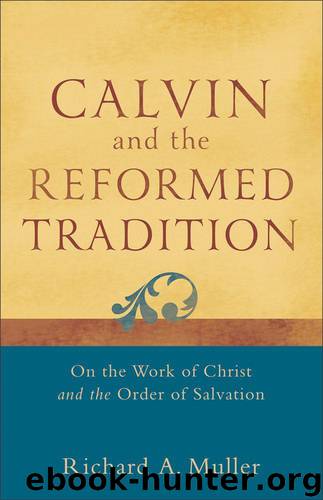Calvin and the Reformed Tradition: On the Work of Christ and the Order of Salvation by Muller Richard A

Author:Muller, Richard A. [Muller, Richard A.]
Language: eng
Format: azw3
Tags: Protestant Scholasticism, REL067080, Jesus Christ—History of doctrines, Calvinism, Reformed Church—Doctrines—History, Salvation—Christianity—History of doctrines, REL093000, Calvin, Jesus Christ—Person and offices, Jean (1509–1564)
ISBN: 9781441242549
Publisher: Baker Publishing Group
Published: 2012-11-15T00:00:00+00:00
7
Union with Christ and the Ordo Salutis: Reflections on Developments in Early Modern Reformed Thought There has been, since the rise of a body of neo-orthodox studies of Calvin’s thought, an increasing interest in the Reformer’s understanding of union with Christ.[1] Several recent studies have argued a major contrast between Calvin’s approach to union with Christ and later Reformed theological formulations of an ordo salutis.[2] Specifically, it has been claimed that Calvin emphasized union with Christ and (without referencing any documents of the era) that later Reformed writers did not, indeed, that they “traded union for a chronological ordo salutis, making union dependent upon prior ‘steps’ in the soteriological process.”[3]
The underlying problem of much of the literature on the subject (one might even call it a cottage industry) is the rather massive, highly theologistic, and ahistorical attention given to Calvin’s understanding of the unio in isolation from the thought of other Reformers and of later Reformed theologians—in contrast to the near absence of attention paid to the doctrine as it was taught by other Reformed thinkers in the late sixteenth and seventeenth centuries. The few current studies that do exist of later Reformed thought on union with Christ arguably indicate, contrary to the assertions found in studies of Calvin by Canlis and Partee, an increased rather than a decreased interest in the subject, particularly in relation to Reformed piety or spirituality,[4] as well as in connection with Reformed, eucharistic thought. Two studies have argued the importance of the unio in the thought of Zanchius,[5] and a series of essays by John Fesko has begun to broach the issue of the relationship of union with Christ to justification and to the development of a Reformed ordo salutis, contesting the claim that the doctrine of union with Christ and the concept of a order of salvation were opposed to each other.[6]
This essay will argue, along lines similar to those outlined by Farthing and Fesko and contrary to the implications and claims of other recent studies, that Calvin was hardly an isolated figure in the early development of Reformed thought on union with Christ and that the Reformation-era connection of the doctrine of union with Christ with the earliest forms of what has come to be called the ordo salutis was an exegetical conclusion that did not disappear from Reformed approaches to the application of salvation in the era of orthodoxy, only to be replaced by a rigid chronological ordering of the stages of redemption, but was in fact incorporated carefully into Reformed orthodox language of the application of salvation. The equally prominent use among the Reformed orthodox of the language of unio in connection with the doctrine and piety of the Lord’s Supper will be left to another essay.[7] As Heinrich Heppe commented more than a century ago, “the entire doctrine of the appropriation of salvation rests upon the insitio or insertio in Christum,” and therefore, the older Reformed dogmaticians “discuss it with special emphasis.”[8]
Download
This site does not store any files on its server. We only index and link to content provided by other sites. Please contact the content providers to delete copyright contents if any and email us, we'll remove relevant links or contents immediately.
The Secret Power of Speaking God's Word by Joyce Meyer(3145)
Signature in the Cell: DNA and the Evidence for Intelligent Design by Stephen C. Meyer(3118)
Real Sex by Lauren F. Winner(3000)
The Holy Spirit by Billy Graham(2933)
The Gnostic Gospels by Pagels Elaine(2515)
Jesus by Paul Johnson(2347)
Devil, The by Almond Philip C(2322)
23:27 by H. L. Roberts(2240)
The Nativity by Geza Vermes(2219)
Chosen by God by R. C. Sproul(2150)
All Things New by John Eldredge(2146)
Angels of God: The Bible, the Church and the Heavenly Hosts by Mike Aquilina(1948)
The Return of the Gods by Erich von Daniken(1925)
Angels by Billy Graham(1914)
Knowing God by J.I. Packer(1843)
Jesus of Nazareth by Joseph Ratzinger(1796)
The Gnostic Gospel of St. Thomas by Tau Malachi(1779)
Evidence of the Afterlife by Jeffrey Long(1773)
How To Be Born Again by Billy Graham(1773)
